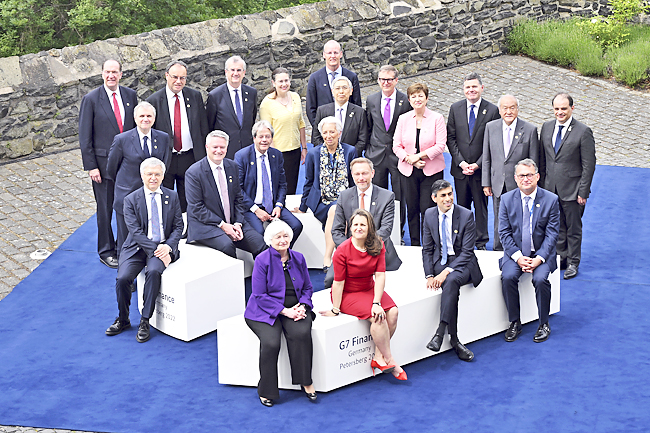KOENIGSWINTER, GERMANY (AP) – United States (US) Treasury Secretary Janet Yellen celebrated a “historic day” last summer when more than 100 nations agreed to a global minimum tax deal, aimed at putting the world’s countries on a more equal footing in attracting and keeping multinational companies. President Joe Biden tweeted that the idea was “diplomacy reshaping our global economy and delivering for our people.”
But this week, as Yellen joined Group of Seven (G7) finance ministers for meetings in Germany, she found herself insisting that prospects for moving ahead with the landmark tax plan were merely “not hopeless”.
The plan is running up against new resistance abroad and old divisions at home as fresh global concerns take center stage.
The ongoing war in Ukraine, the threat of rising food insecurity, crushing inflation and other urgent matters have stolen finance ministers attention away from putting the plan in place before a 2023 deadline.
To add to the pressure, Poland solidified its opposition with a veto at an April European Union finance ministers meeting in Brussels. And Republicans in Congress are balking, too.
On Friday, the G-7 finance ministers wrapped up their two days of meetings with a joint statement that was most notable for announced pledges of USD19.8 billion in economic aid for Ukraine. It included only brief mention of the tax idea, saying the ministers reiterated a “strong political commitment to the timely and effective implementation” of the plan to bring “new rules into effect at global level”.
Broadly speaking, the global minimum tax deal is designed to subject large multinational firms to a 15-per-cent tax rate wherever they operate. The deal also provides for taxing part of the profits of the largest global companies in countries where they do business online but may have no physical presence.

It is supposed to halt an international race to the bottom for corporate taxation that has led multinational businesses to book their profits in countries with low tax rates. This enables them to avoid taxes and encourages countries to slash rates to attract the companies.
The G7 website calls it “a genuine revolution in international tax law”. French Finance Minister Bruno Le Maire has called it “the most important international tax agreement in a century”.
But Poland is raising new concerns about how the plan would be implemented, and the G7 meetings did not appear to break the logjam. EU rules require member nation unanimity to change tax-related laws. Germany’s Finance Minister Christian Lindner said at the end of the G7 minister meetings that “all the technical concerns have been dispelled, so there can be no technical considerations any more, but … highly political ones”.
A spokesperson for Poland’s finance ministry Wydzial Prasowy cited concerns about the “lowering of the EU’s competitiveness and placing of additional burden on European businesses” without ensuring that digital giants are adequately taxed.
He added that the concerns were heightened ”especially when faced with difficulties of the current post-pandemic times.”
Yellen, who has made the tax deal one of her top priorities as Treasury secretary, opened this week’s visit to Europe with a stop in Poland, in part to urge Polish leaders to reconsider their position.
“We’re working to try to address their concerns,” she told reporters Thursday. “We would love to see Poland come on board. I think it is not hopeless.”
So far, 137 countries representing nearly 95 per cent of the world’s gross domestic product have agreed on the plan meant to “ensure that corporations fairly share the burden of financing government,” she said.
But Yellen also faces headwinds at home from congressional Republicans who have displayed little appetite for having the US hold up its end of the agreement.
They have said the plan would make the US less competitive in a global economy.
Top Republican on the Senate Finance Committee Senator Mike Crapo of Idaho and top Republican on the House Ways and Means Committee Republican Kevin Brady of Texas both pointed to Poland’s opposition in a joint statement last month.
“If the EU is already hitting roadblocks, no one should expect countries like China to implement this deal anytime soon,” they said.
A fellow at the Urban Institute and a co-founder of the Urban-Brookings Tax Policy Center in Washington Eugene Steuerle said the deal may be unlucky to have been born in politically fractured times.
“What makes anything like this difficult these days is that the two parties are so divided,” he said.
“That’s what really threatens this legislation more than the idea – which I think would traditionally have gotten support, at least some support from both sides of the aisle.”
There’s also just the crush of other global concerns demanding attention.
Economics professor at the College of William & Mary in Virginia David Feldman said “governments have a certain amount of bandwidth – the current events have to push some of these other things a little further down the list”.







